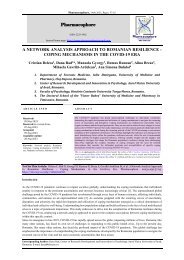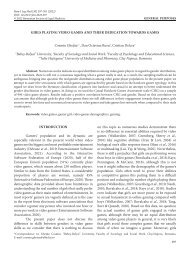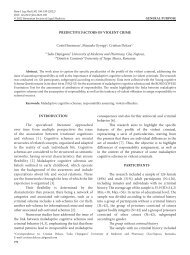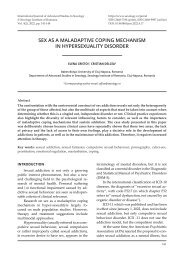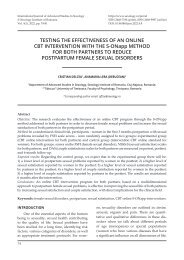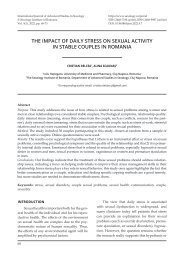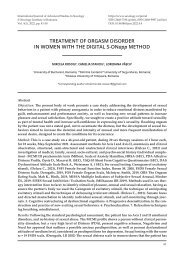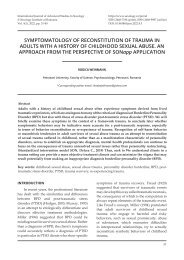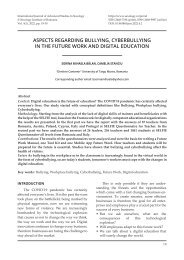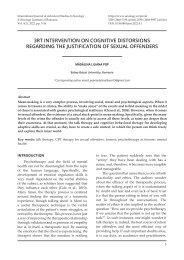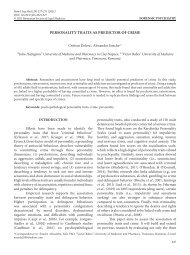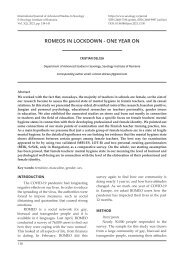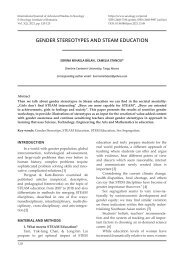RESEARCH ON HUNGARIAN FEMALE TEACHERS' MENTAL HYGIENE STATE WITH SPECIAL REGARD TO THE DEVELOPMENT OF THEIR PROFESSIONAL AND FEMALE IDENTITY
We worked with the fact that, nowadays, the majority of teachers in schools are female, so the aim of our research became to assess the general state of mental hygiene in female teachers, and its causal relations. In this study we presented the may-sided, diversified roots of the research, based on positive, Jungian and personal psychology, educational researches on teachers personality, gender issues in education. We also exhibited the connected studies on stress and burn out mostly in connection to teachers and the field of education. The research has a specific focus on female teachers' mental hygiene states in connection with their developing professional and female identity. We pointed out some connections of our main points of examination and the Finnish teacher training practice, too. As a main hypothesis we presume that just a certain group of female teachers are in a state of fragile mental hygiene. In the detailed hypotheses we are looking for evidence that the mental hygiene state shows differences between certain groups among female teachers. The best way for examination appeared to be by using two validated (MBI-ES, LOT-R) and two personal creating questionnaires (BÉIK, SzSzK, only in Hungarian), as a comparative survey. On the whole, our starting assumption has been proved, that female teachers' mental hygiene state in our meaning the level of burnout and psychological well-being are in connection with the level of the elaboration of their professional and female identity.
We worked with the fact that, nowadays, the majority of teachers in schools are female, so the aim of our research became to assess the general state of mental hygiene in female teachers, and its causal relations. In this study we presented the may-sided, diversified roots of the research, based on positive, Jungian and personal psychology, educational researches on teachers personality, gender issues in education. We also exhibited the connected studies on stress and burn out mostly in connection to teachers and the field of education. The research has a specific focus on female teachers' mental hygiene states in connection with their developing professional and female identity. We pointed out some connections of our main points of examination and the Finnish teacher training practice, too. As a main hypothesis we presume that just a certain group of female teachers are in a state of fragile mental hygiene. In the detailed hypotheses we are looking for evidence that the mental hygiene state shows differences between certain groups among female teachers. The best way for examination appeared to be by using two validated (MBI-ES, LOT-R) and two personal creating questionnaires (BÉIK, SzSzK, only in Hungarian), as a comparative survey. On the whole, our starting assumption has been proved, that female teachers' mental hygiene state in our meaning the level of burnout and psychological well-being are in connection with the level of the elaboration of their professional and female identity.
You also want an ePaper? Increase the reach of your titles
YUMPU automatically turns print PDFs into web optimized ePapers that Google loves.
Research on Hungarian Female Teachers' Mental Hygiene State With Special Regard<br />
that the feminization of the teaching profession<br />
may not have any significant impact.<br />
At the same time, Buda says that women, by<br />
nature, are more sensitive and more capable<br />
of empathy than men. In our opinion, the<br />
explanation of these features has nothing to do<br />
with the temperament of the female, hence, in<br />
the field of pedagogy, which is dominated by<br />
women, could we notice empathetic expressions,<br />
or expressions without empathy.<br />
The question arises whether gender itself<br />
predisposes an individual toward certain operational<br />
behaviour patterns, or toward a state<br />
of mental hygiene, or whether personal disposition<br />
makes a difference? The latter arises in<br />
studies by Zsuzsa F.Lassú (F. Lassú, 2001,<br />
2004).<br />
One question remains: whether the<br />
plurality of the female personality plays a role?<br />
How much are women aware of their personality,<br />
how authentically do they live? Do they<br />
simply adjust their personality to the expectations<br />
of society (Kovács E., 2012)? How aware<br />
are female teachers of other questions relating<br />
to their profession? Does the measurement of<br />
awareness make any difference in the mental<br />
hygiene state, or to the extent of burnout?<br />
In what circumstances could they sustain a<br />
healthy personality?<br />
Another issue further complicates the<br />
matter: how the state of teachers is influenced<br />
by the way the topic of gender is handled in<br />
schools, and the almost complete invisibility of<br />
the topic in everyday life.<br />
The awareness is also a question according<br />
to how developed the professional personality<br />
is.<br />
Whether an individual who is aware of her<br />
place and has built her professional personality<br />
is less vulnerable according to the controversial<br />
expectations upon women (like a teacher<br />
and like a female)? Does an individual who is<br />
more aware choose her operational skills and<br />
reactions, does she feel her identity as a whole,<br />
and experience greater protection in her state<br />
of mental hygiene? It has become clear that<br />
this awareness when developing female and<br />
professional identity is a basic point in our<br />
examination.<br />
Another important point of view for us is<br />
that we intended to examine the female teacher’s<br />
mental hygiene state, not just merely from<br />
the deficiency side, but from the resource’s side<br />
also. For this reason, the approach of positive<br />
psychology found a place in the research and<br />
the interpretation.<br />
From this aspect, we do not focus on deficit,<br />
but psychological well-being and its elements.<br />
Aims of the research assess the state of<br />
mental hygiene in female teachers<br />
We worked with the fact that, nowadays,<br />
the majority of teachers in schools are female,<br />
so the aim of the research became to assess<br />
the general state of mental hygiene in female<br />
teachers, and its causal relations. The long-term<br />
aims of the research are to contribute to the<br />
creation of a state of well-being with relation<br />
to teacher’s mental hygiene; and through their<br />
state of well-being, thrive in a school climate,<br />
and indirectly help to create a less stressful,<br />
healthier climate for the students.<br />
Another aim of our research is to refute<br />
those theoretical pathways and practical<br />
misbeliefs which surround the concept of the<br />
feminization of the teaching profession.<br />
The research has a specific focus on female<br />
teachers’ mental hygiene states in connection<br />
with their developing professional and female<br />
identity, so to provide a many-sided view<br />
which allows us to be aware of certain nuances.<br />
Our research examines personal and<br />
professional identity, focusing on active female<br />
teachers’ mental hygiene state, and searches<br />
for relationships between presence of personal<br />
and professional identity, their level of elaboration,<br />
and the state of mental hygiene. It is<br />
important to point out, taht the survey of the<br />
mental hygiene state came from two directions.<br />
From burnout, and from the shape of personal<br />
life orientation as a predictor of psychological<br />
well-being.<br />
The dissertation represents psycho-dynamical<br />
theoretical aspects of the personality,<br />
which has roots in the possibility of continuous<br />
development, and it seeks to identify the presence<br />
of the conscious shaping of it with the<br />
complex examination of the female teachers’<br />
mental hygiene state.<br />
127




